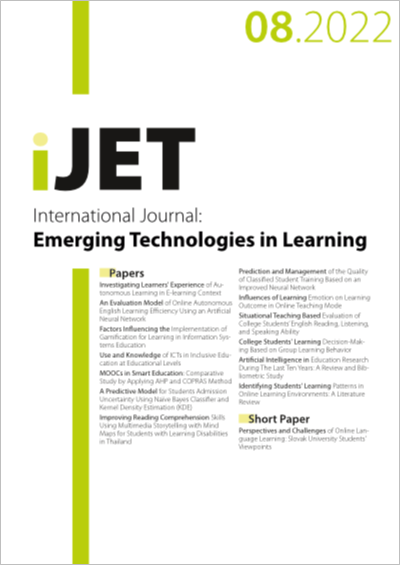Artificial Intelligence in Education Research During The Last Ten Years: A Review and Bibliometric Study
DOI:
https://doi.org/10.3991/ijet.v17i08.29833Keywords:
AIED, Bibliometric, EducationAbstract
Research on Artificial Intelligence in Education (AIED) has increased rapidly in recent years, so efforts are needed to understand the status of trends and their development to support and focus these trends. The specific objectives of this study are to analyze document type, source document, contributed country, language, top affiliation, sponsorship funding, top source title, subject area, research station, visualization of mapping research trends across and top 50 cited publications, reviewing some of the top-cited publications on AIED research over the last ten years using bibliometric analysis. The metadata used is the Scopus database and a mapping application using VOSviewer with 457 documents. The bibliometric results show that the development of AIED research has increased exponentially over the last five years. The most common types of documents are articles, journal document sources, and China's most productive country. English being the most significant language, the most prolific author was Kalles, D, some of the top prolific affiliates with four publications, while the most sponsored funding was the National Natural Science Foundation of China and the National Science Foundation. “Journal of Physics: Conference Series” is the primary source, the most research subject area is Computer Science, for the top-cited author is Holmes, W. Mapping of research trends shows that AIED research trends in the last ten years are: 1) it's an application to students; 2) the subject of education in engineering educations; 3) teaching methods; 4) e-learning based education; 5) education system; 6) curriculum included AI. AIED integration could revolutionize the education system.
Downloads
Published
How to Cite
Issue
Section
License
Copyright (c) 2022 Dr. Binar Kurnia Prahani, Iqbal Ainur Rizki, Prof. Dr. Budi Jatmiko, M.Pd., Nadi Suprapto, Ph.D., Tan Amelia, S.Kom., M.MT.

This work is licensed under a Creative Commons Attribution 4.0 International License.



